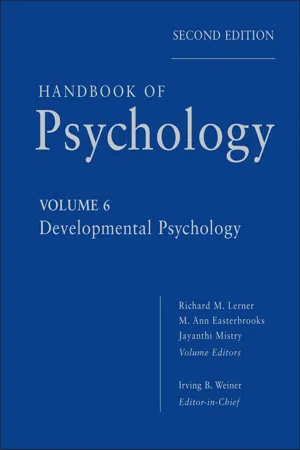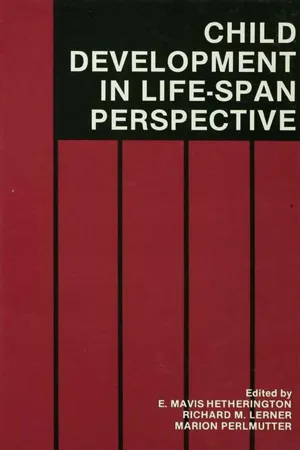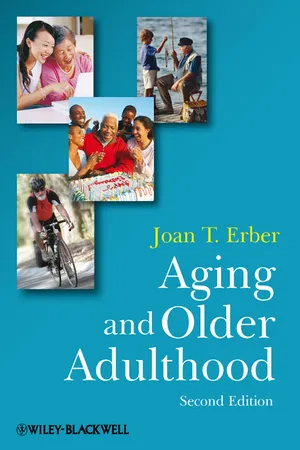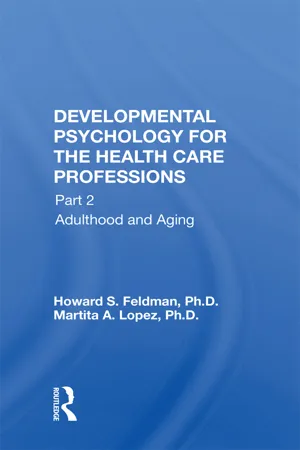Psychology
Cognitive Development in Adulthood
Cognitive development in adulthood refers to the changes and growth in mental processes and abilities that occur as individuals age. This includes aspects such as problem-solving, decision-making, and memory. While some cognitive abilities may decline with age, others, such as wisdom and expertise, may continue to develop. Factors such as lifestyle, education, and social engagement can influence cognitive development in adulthood.
Written by Perlego with AI-assistance
Related key terms
9 Key excerpts on "Cognitive Development in Adulthood"
- eBook - ePub
- Irving B. Weiner, Richard M. Lerner, M. Ann Easterbrooks, Jayanthi Mistry(Authors)
- 2012(Publication Date)
- Wiley(Publisher)
Overall, how, why, and when cognition changes with aging are seen as integrated developmental questions—questions that reflect classic developmental issues and relate to numerous neighboring developmental processes. Indeed, issues considered in the study of cognitive aging go to the heart of our view of both the human life course, in general, and of developing (aging) adults, in particular. Although it may be used in different ways and to accomplish different goals, cognition is no less important in late adulthood than in early and middle adulthood. Not only is it a basis of one's achievements and competence, but it contributes to—or detracts from—one's sense of self-efficacy and the efficiency with which one (a) engages in life planning and life management and (b) pursues, achieves, or re-evaluates life goals (Heckhausen et al., 2010). Therefore, it is instructive to briefly compare the basic stories told about cognitive development during the first 20 or so years of life, on the one hand, and during the remaining 60 (or so) years of life, on the other. Obviously, the stories told of infant, child, adolescent, and even early adult cognitive development are generally optimistic. Cognition during these years is progressing and growing, channeled in part by the typical social worlds and the rapidly maturing neurobiological substrate. From early life, cognitive potential is being realized, steadily if not ineluctably. For normally developing individuals there are some differences in level of performance attained and in the rate at which growth occurs, but virtually no differences in the direction of change. Although cognition improves from infancy, around early adulthood the story of lifespan cognitive development evidently changes. The word “evidently” is used because there is some controversy about the range and causes of aging-related changes in cognition - eBook - ePub
Leader Development for Transforming Organizations
Growing Leaders for Tomorrow
- David V. Day, Stephen J. Zaccaro, Stanley M. Halpin(Authors)
- 2004(Publication Date)
- Psychology Press(Publisher)
3 Cognitive Skills DevelopmentPassage contains an image
6 The Development of Adult Cognition: Understanding Constancy and Change in Adult Learning
Diane F. Halpern Claremont McKenna CollegeDOI: 10.4324/9781410610102-9For much of the history of psychology, adulthood was treated as though it were a relatively uninteresting developmental plateau that followed the rapid rise in physical and cognitive development of adolescence and preceded the steady decline that led to old age and death. The most influential developmental psychologists of the 20th century must have believed that psychological development was halted before most people reached their adult height. For the eminent Swiss developmental psychologist Jean Piaget (1952) , final stages of cognitive development were achieved before the adult years were reached.Several events have come together to create a new interest in adult development, especially in cognitive and emotional domains. Perhaps the most important impetus for making adult development a critical research topic is the phenomenal increase in expected life spans. In the last 100 years or so, life expectancies have increased by several decades (from age 47 at the start of the 20th century to approximately 77 at the start of the 21st century) in most, but not all, regions of the world. The large number of people living well into adulthood and old age has created a need for a better understanding of this stage of life. As John Horn (2001) , a psychologist who specializes in adult cognition, recently reminded us that learning and cognitive development do not end on entry into the adult years.The Need for Lifelong Learning
There is a riddle that goes something like this: “What do you call a secretary who has not learned new job skills in the last 10 years?” The reader can probably guess the answer—“unemployed.” The same answer would be correct for almost any job category above menial labor that can be named. The need for lifelong learning has become more urgent over the last two to three generations as the world has become increasingly complex. The future of our country and our planet requires that a greater proportion of the population achieve an advanced education. Adults who only a generation or two ago may have wondered if they should complete high school now need to continue to learn new and complex cognitive skills throughout their adult years, and this learning needs to build upon a solid foundation of knowledge and thinking skills. The rate at which knowledge has been growing is exponential and the most valued asset of any society in the coming decades is a knowledgeable, thinking workforce. - eBook - ePub
- E. Mavis Hetherington, Richard M. Lerner, Marion Perlmutter(Authors)
- 2013(Publication Date)
- Psychology Press(Publisher)
9 COGNITIVE DEVELOPMENT IN LIFE-SPAN PERSPECTIVE: From Description of Differences to Explanation of Changes Marion Perlmutter University of Michigan ABSTRACT The purposes of this chapter are to articulate an agenda for cognitive developmentalists and to consider how well it is being met. It is suggested that cognitive developmentalists should be addressing two major questions: What are the ways that cognition changes with age? and What are the causes of this change? An overview of alternative approaches to the study of cognitive development is presented, and an integrative, three tier model, framed within a multidisciplinary perspective is forwarded. It is argued that research on cognitive development has made considerable progress with respect to describing the ways that cognition changes with age but has failed in explaining the causes of age change. Some conceptual reasons for the paucity of such information are discussed, and recommendations are made for the reconceptualization of research design, adoption of a life span perspective, and reassessment of assumptions. INTRODUCTION Cognition is a psychological construct that refers to all of mental life. It includes perception, memory, intelligence, reasoning, judgment, and decision making. It permits humans to represent and to think about the world, to conceptualize experience, to fantasize beyond experience, to maintain a sense of self, and to communicate with others. It expands individual competence and allows us to solve and to circumvent problems. Memory, for example, keeps track of events that have occurred in different times and distant places. Intellectual skills enable us to reflect upon experiences and to attach meaning and significance to them. As individuals, this ability gives us the power to anticipate and plan for the future, to develop strategies, to hypothesize alternatives, and to evaluate consequences - eBook - ePub
Learning in Adulthood
A Comprehensive Guide
- Sharan B. Merriam, Lisa M. Baumgartner(Authors)
- 2020(Publication Date)
- Jossey-Bass(Publisher)
Chapter 15 ). By discovering more about how the brain actually functions, we have a better chance of unlocking lifelong learning disabilities and such crippling diseases as Alzheimer's and Parkinson's, which can render adults incapable of learning even at a rudimentary level. There is a great deal of potential to enhance what we know about individual learners, especially when we merge the ideas from the cognitive and neurobiological sciences.In addition to what is happening in the mind of an adult learner, there is a burgeoning literature looking at learning as an embodied, emotional, and perhaps spiritual occurrence (see Chapter 9 ). Although this research and writing still focus on the individual learner, it is at the same time expanding our understanding of learning beyond an information processing, cognitive activity.Just being an adult is thus a crucial factor in distinguishing between learning in adulthood and learning in childhood. The accumulation of experience, the nature of that experience, the developmental issues adults address, how the notions of development and experience relate to learning, and how aging affects our memory and the more general neurological basis for learning—all of these differentiate adult learners from children.The Context
Historically, adult educators in social action and community-based learning programs have taken the context into account in their work. From Jane Addams's Hull House immigrant programs to Highlander's Research and Education Center's involvement in labor movements, civil rights, and environmental action, the adult learner was seen as affected by, and having an effect on, his or her social context. However, it was not until the 1980s or so that context received more systematic attention in the literature on adult learning, due in part to a heightened interest in critical and feminist theory. There are at least two ways to think about context in this more recent work. The first is the notion that learning is a product of the individual interacting with the context. Recent theories of situated cognition, reflective practice, and cognitive development are representative of this interactive view. A second way to view the importance of context in learning is to consider how the structures and institutions of society affect learning. These structural dimensions include factors such as race, class, gender, cultural diversity, and power and oppression. - eBook - ePub
Progress in Psychological Science around the World. Volume 1 Neural, Cognitive and Developmental Issues.
Proceedings of the 28th International Congress of Psychology
- Qicheng Jing, Mark R. Rosenzweig, Gery d'Ydewalle, Houcan Zhang, Hsuan-Chih Chen, Kan Zhang(Authors)
- 2013(Publication Date)
- Psychology Press(Publisher)
24 Cognitive aging: Some recent developments
Patrick LemaireThe main goal of research in cognitive aging is to understand how cognition changes with age. This first entails determining what changes and what remains stable with age (which cognitive processes are affected and which are not affected during aging). It also requires investigating who is aging fast and who is aging more slowly so as to determine individual characteristics (e.g., lifestyle, cognitive profiles) underlying individual differences during aging. The third general goal of research in cognitive aging is to determine the mechanisms by which age exerts its effects on human cognition. It is not enough to describe age-related differences or similarities in human cognition. It is also necessary to understand the mechanisms responsible for these changes. Finally, research on cognitive aging is conducted with the hope that some means will be discovered to more effectively help older people to have a better life and stay autonomous as long as possible.This chapter reviews some recent findings in cognitive aging that speak to two of these fundamental issues. First, we shall see that a great deal of research has been carried out to discover what changes and what does not change with age in human cognition. The findings that are used to illustrate how psychologists have been pursuing this goal show that we are still trying to find out what characterizes processes spared during aging. In particular, we see that what are thought to be the main characteristics (i.e., automaticity of cognitive processes) may not be the crucial dimension. Next, I argue that one of the most important recent conceptual developments in research on cognitive aging lies in the goal of trying to understand how changes occur during aging. In particular, I consider some examples of my research (and that of others) which suggest that looking at strategic variations is fruitful to pursue this goal. I then give a few words of conclusion recapitulating why it is important to look at strategic variations to understanding cognitive aging. - eBook - ePub
- Joan T. Erber(Author)
- 2011(Publication Date)
- Wiley-Blackwell(Publisher)
Stages of Cognitive DevelopmentHarold and Hazel turned 65 within a few days of one another and later that month they celebrated their 40th wedding anniversary. At this point in their lives, both of them realize they have reached a crossroads and should make a decision about changes in their lifestyle. Harold wants to sell the large home where they raised their children and move into a condominium with an exercise facility on the premises and access to public transportation, which will come in handy if they give up driving at some point. Hazel is less enthusiastic about this idea. She loves their familiar home, but realizes that she and her husband should have a plan in place for how they will live when they are no longer quite so independent. For starters, she thinks they should install grab bars in the bathrooms and make further physical modifications to their home as needed. At present they do not see eye to eye, but Harold and Hazel are each trying to consider the perspective of the other in the hope that they can create a mutually satisfactory plan. They think it might help to bring their grown sons into the decision making process to see what suggestions they might have.Many older adults claim their memory is not as good as it once was (Erber et al., 1992). In contrast, however, they feel their ability to think, reason, and solve problems has gotten better over the years (for example, Williams, Denney, & Schadler, 1983). This perception contrasts sharply with the age-related decline found on psychometric tests of fluid abilities that were described in Chapter 6. Perhaps the reason older adults believe that their problem-solving abilities have improved is that the problems they confront in everyday life differ from those found on psychometric tests. Most problems on psychometric tests have only one correct answer, whereas the problems encountered in real life often have more than one solution.Are there differences in how young and older adults approach and solve everyday problems? At various stages of life, individuals may have different reasons, or motivations, for using their cognitive capabilities. As a first step in approaching cognition and problem solving in the everyday world, we will discuss theories that view cognition as having distinct purposes at each stage of the life span.Schaie’s Stage Model of Cognitive/Intellectual DevelopmentSchaie (1977–1978) contends that we use our cognitive/intellectual capabilities for whatever purposes are most meaningful, or relevant, for our particular stage of life. Initially, Schaie outlined four sequential stages of development, each associated with a different motivation for using cognitive processes (see Table 7.1 - eBook - ePub
Developmental Psychology For The Health Care Professions, Part Ii
Young Adult Through Late Aging
- Howard. S. Feldman(Author)
- 2020(Publication Date)
- Routledge(Publisher)
5 Cognitive Processes in Later AdulthoodThe study of intellectual and mental processes in old age is a major part of the psychology of aging. Traditionally, these cognitive processes are divided into topics such as memory, learning, problem-solving, and so on However, it should be remembered that these distinctions are largely conceptual and break down rapidly as one becomes better acquainted with the nature of the processes. For example, it is very difficult to test learning without also assessing memory, as learning involves acquisition of knowledge and memory involves storing and then retrieving it.Significantly more attention is devoted to these particular processes in the elderly than in young and middle-aged adults. The reason for this difference is the greater rate of change investigators have found in later adulthood. The changes themselves are gradual and often begin in middle age or even as early as the 20s. They may be noticed by the individual only very late in life and may cause little or no functional loss. Those changes that are the hallmarks of advanced age are minor loss of memory function and slowing of motor performance.Sensation and Perception
Sensation and perception are often discussed as though they were two separate processes, but, like learning and memory, they are so closely related that it is difficult to discuss them separately. Sensation may be defined as input from physical stimuli; perception refers to the interpretation of sensory information. Age-related declines in both sensation and perception have been documented.Sensation
Vision is one of the major areas in which research on the relationship between age and the senses has been conducted. Most deficiencies in vision with age can be traced to physiological changes such as reduced pupil size, loss of lens transparency, and reduced lens elasticity (McKenzie 1980). Acuity, or the ability to see small objects clearly at a distance, is stable until age 40 or 50 and then declines markedly (Botwinick 1978). These changes can usually be overcome through the use of magnifying lenses and higher levels of illumination. With decreases in illumination below moderate levels, the acuity of an elderly person will suffer much more than that of a younger adult (March 1980). - eBook - ePub
- Patricia Heindel(Author)
- 2016(Publication Date)
- Research & Education Association(Publisher)
CHAPTER 6 Cognitive Development Throughout the Life Span Chapter 6 Cognitive Development Throughout the Life SpanELEMENTS OF COGNITIVE DEVELOPMENTThinking is defined as the manipulation of mental representations. Cognition includes the mental activities involved in the acquisition, storage, retrieval, and use of knowledge. The most rapid cognitive development takes place during the first few years of life when the brain is growing rapidly. As the following discussion shows, however, cognitive development is best described as a life-long process.ConceptsA basic element of thought is the concept. A concept is a label that represents a class or group of objects, people, or events that share common characteristics or qualities. We organize our thinking by using concepts, and concepts allow us to think about something new by relating it to a concept we already know.Some concepts are well-defined, and each member of the concept has all of the defining properties; no nonmember does. An example would be registered voters—you either are or are not registered to vote. Other concepts are not so clearly defined but are encountered frequently in our everyday life. These natural concepts have no set of defining features but instead have characteristic features—members of this concept must have at least some of these characteristics. “Bird” is a natural concept. Birds range from chickens to sparrows to ostriches. Prototypes are objects or events that best represent a natural concept. A sparrow or robin would be considered a prototypical bird by many individuals. New concepts are easier to learn if they are organized around a prototype.ReasoningReasoning involves processing information to reach a conclusion. It includes evaluating and generating arguments to reach a conclusion. Inductive reasoning involves reasoning from the specific to the general. For example, drawing conclusions about all members of a category or concept based on only some of the members is inductive reasoning. Deductive reasoning is reasoning from the general to the specific. Making a prediction based on a theory involves deductive reasoning. Logical reasoning involves using mental procedures that yield valid conclusions. - Dominic Upton(Author)
- 2013(Publication Date)
- Routledge(Publisher)
Odell and Holbrook (2006) suggest that care that should be provided for older people requires special expertise. This is due to the following reasons:Physiological ageing alters the presentation of disease and effects of medication. Incidence of depression, dementia and delirium become increasingly common. Pre-existing conditions can make self-care more difficult. Social support for successful discharge requires complex organisational skills. Key messageWhen interacting with an older adult, do not expect them to act in a stereotypical ‘old’ manner. Treat them as an individual.3.10 Cognitive changes in adulthoodCognitive Impairment is defined as a slight impairment in cognitive function with otherwise normal function in the performance of activities of daily living (Prabhavalkar and Chintamaneni, 2010). There are a number of losses which are associated with cognitive impairments . Hall (1988) divides these into four losses. These are:Intellectual loss – loss of memory, loss of sense of time and loss of expressive and receptive language abilities.Affective/personality loss – loss of affect, antisocial behaviour and paranoia.Planning loss – loss of ability to plan activities and functional loss.Low stress threshold – decreased ability to tolerate stress.Until relatively recently it was commonly assumed that intellectual capacity peaked in the late teens or early twenties, levelled off, and then began to decline fairly steadily during middle age, declining rapidly within old age. However, these cross-sectional studies were methodologically weak. Furthermore, several studies have indicated that at least some people retain their intellect well into middle age and beyond (Bosma et al., 2003). Nevertheless, this evidence does seem to suggest that there are some age-related changes in the differing types of intelligence and aspects of memory.In terms of intelligence, there is some indication that older people’s IQ score deteriorates as they increase in age. Physiological changes related to the ageing process can have a serious effect on the brain’s functioning which, in turn, can have an impact on intellectual performance (Beinhoff et al
Learn about this page
Index pages curate the most relevant extracts from our library of academic textbooks. They’ve been created using an in-house natural language model (NLM), each adding context and meaning to key research topics.








